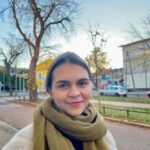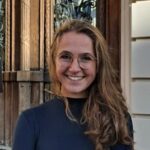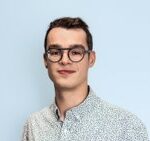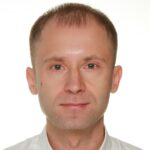I realised that our workshops not only benefited the children; they also provided respite to their weary parents. It’s gratifying to know that our efforts positively impacted the entire family.
Getting Healthy Through Fun: Bridging Children’s Health and Happiness in Hospitals
The Getting Healthy Through Fun initiative breathes new life into the typical hospital experience. Through creative workshops, university students build strong connections with children and enrich challenging hospital stays with hours of joy and creativity. By adapting to various health needs and collaborating with local businesses, the project emphasises the importance of participation and engagement for medical students, kids and their families.
Participation means building a community, drawing strength from shared experiences and offering my time and energy for a greater good.
Ewa Sokołowska, the project coordinator, shares her insights on the unique approach of the Getting Healthy Through Fun initiative.
What is your project about?
Our team of volunteers works with children through interactive workshops in the hospital, tailoring our sessions to themes like seasonal crafts or other educational elements. Our primary goal is to combine fun and learning. As a result, we allow children to express themselves freely and provide a break from their typical hospital routine.
How did this project begin?
I’ve been actively involved in this project for two years, right from its first inception. I joined the team after a call for volunteers was announced within our scientific circle. As the initiative evolved, I took on additional roles, eventually leading the coordination of its second edition. The European Solidarity Corps generously funded our vision.
How did the core members of the current team join in?
Anja found us through Facebook, drawn to the mix of art activities like painting and the project’s inspiring purpose.
Gregor, a fourth-year med student, joined to better understand the personal side of healthcare and to improve how he establishes connections with young patients.
Paula, after finishing her first year of medical studies, saw this effort as a way to help kids in hospitals, using what she learned from her scouting days.
And then there’s Krzysztof whose journey is particularly interesting. Even though he studied computer science, his mom, a paediatrician, got him interested, and he was also influenced by his two brothers being part of it.
How did you prepare for this project?
I remember when we started, our initial approach was to align our events with the seasons or whatever was significant for that month, for example Christmas celebrations. As time went on, it became clear that having a structure was good, but being flexible was even more critical.
Emotionally, the beginning was a learning curve for many of us. It’s not easy stepping into a healthcare setting and interacting with kids when you’re not entirely sure of their health issues. We learned that letting the conversation progress naturally and genuinely listening to their stories made it easier to connect.
One thing that stands out is how the children perceive us. They don’t look at us as their future doctors but more as friends. This builds a space where they’re free to be themselves, away from the usual doctor-patient setting. And their curiosity? It’s incredible. Many of them are just a few years younger, and once they learn about our backgrounds, they often see us more as equals than anything else.
To what extent have you involved children in designing the activities?
Involving children in decision-making has always been one of our priorities. While we provide a framework or theme for the activities, we often let the children choose specific tasks or projects. For instance, during our photography sessions, we provided a range of costumes representing different months. The children chose their preferred costumes, suggested ideas for makeup and even proposed poses. Their creativity was truly impressive. We always encouraged them to express their ideas and take ownership over their participation.
At the end of each event, we also distribute questionnaires asking for feedback. We seek children’s opinions on what they liked, what could be improved, and if they have any fresh ideas. Their insights help us refine our approach and better cater to their needs.
We also consult with the parents, if available, to gain their perspective. They provide insights on how their children coped with the tasks. This feedback is invaluable as it helps us to determine if our initiatives were effective. Given that the project has spanned two years, the experiences from the first year informed our approach in the next year, allowing for continuous improvement.
Can you recall a moment that truly highlighted the importance of what you’re doing?
There have been so many insightful moments for me as a project leader throughout this journey. One time, a mother shared something that really reshaped how we saw our impact. She told us that while our sessions might not make the hospital feel like home, they give her child a chance to have some control in a place where everything is scheduled and regimented.
Krzysztof told me about a sushi-making session where the true spirit of the project shone through. A child accidentally spilled their sushi, and without hesitation, other kids offered theirs. It was a genuine moment of unity and compassion.
Paula recalls a physics-themed event at which the kids’ curiosity was astounding. They asked such detailed questions about the two types of sand we used, showcasing an incredible thirst for knowledge in the process.
And Gregor had this meaningful interaction with a British girl who was moving to his hometown, Gdańsk. They talked about potential high schools she could attend. It was a beautiful reminder that these kids are so much more than just patients; they have dreams, goals and unique stories.
In reflecting on the children’s diverse backgrounds at the hospital, how do you prepare for these differences and address challenges?
Age plays an important role in our approach. We tailor activities for kids between 5 and 18, with younger ones often enjoying the help of their parents. Hands-on tasks are a hit since they’re universally fun. For children in critical states, we might provide something extra for their rooms. We’ve made accommodations for patients with post-surgery challenges and others requiring equipment.
Flexibility is vital. If a three-year-old finds a task challenging, then we might give them water or rice to play with, ensuring that they feel comfortable. Our team always assists when needed, and safety is our top priority.
What about the involvement of parents?
Parents are always welcome. We invite them to join, especially if the children are young. We give parents the choice: they can either participate with their child or take a break, knowing their child is in safe hands. These sessions also offer parents an opportunity to relax and momentarily divert their minds from the hospital environment.
What has been your experience of working with local companies?
We’ve invited local companies from Gdańsk and surrounding areas to conduct workshops on art crafts, cuisine and other activities. For instance, we had a ‘forest in a jar’ activity and photography sessions, which culminated in creating a year-long calendar featuring our patients. Our aim was not only to engage the children but also to support local businesses, especially those that faced challenges due to the aftermath of COVID-19. We preferred collaborating with small, unique businesses, and we helped them to gain exposure while benefiting from their expertise.
From the many shared experiences and learnings, what would you say your team has gained for the future?
We’ve recognised the importance of refining soft skills. For many of us, this was our first hands-on interaction with patients, and navigating those initial uncertainties has been enlightening.
Additionally, the organisational aspects of this initiative were invaluable. Learning to manage budgets, communicate within a diverse team and develop new relationships has been transformative, especially for members who came from different backgrounds and were not exposed to this environment before.
Project outcomes
Internationally, the project gained recognition by winning the SALTO Awards 2022 in the Solidarity & Volunteering category, which led to coverage in youth work-related channels worldwide and in Polish media.
Instagram account: @do.zrowia
Facebook account
Video from the SALTO AWARDS
Publication in the news
Publication in the news
About the project
Supported by:
European Solidarity Corps
EU Youth Programme Priority:
Inclusion and Diversity
Topic:
Youth Participation / Promoting Participation for All
Youth Participation / Skills Development and Volunteering
Visibility:
The project gained significant attention both locally and internationally. In the local community, its visibility was enhanced through collaborations with local enterprises, features on the official Gdańsk city portal and active presence in university channels and on social media. Internationally, the project gained recognition by winning the SALTO Awards 2022 in the Solidarity & Volunteering category, which led to coverage in youth work-related channels worldwide and in Polish media.
Organisations involved:
Association for the Support and Development of the Clinic of Pediatrics, Gastroenterology and Oncology of the Medical University of Gdańsk









